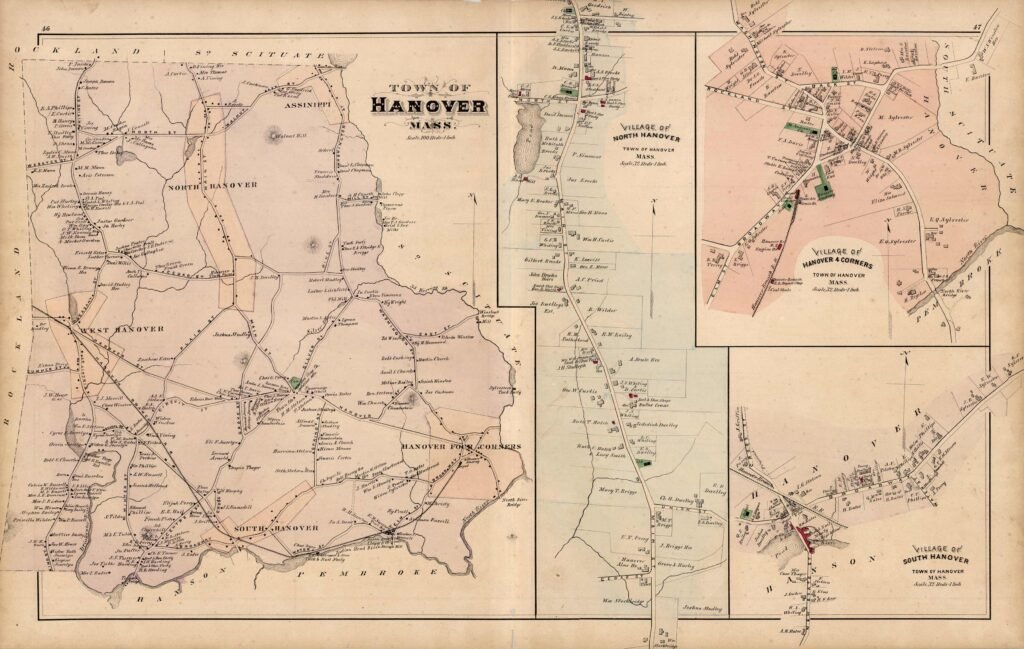An historical sketch about Hanover, Plymouth County, Massachusetts as abstracted from the Plymouth County Directory and Historical Register of 1867. Includes a list of the men from Hanover who gave their life during the Revolutionary War.
Settled in 1649, Hanover was not incorporated until 1727. Nearly all its territory was originally a part of Scituate. The town was named in honor of the Duke of Hanover, afterwards King George the First. The first settlement was at the Four Corners, and along the North and Indian Head rivers, William Barstow, shipwright, being a pioneer. The outlines of his cellar are still visible. His grandson Benjamin, had a family of twenty-one children. The piers of the first bridge built over North River, in 1662, may still be seen. Ship-building was commenced here as early as 1660, by the Barstow family, some of whom afterwards moved to Mattapoisett, and carried on the same business. Barstow’s forge, (now Sylvester’s), was erected in 1720. The Curtis Forge was erected in 1704, by the Burdens, who came from Scotland.
There were seven Indian nations in New England. The Wampanoags, divided into 32 tribes, with 3000 warriors, under Massasoit, occupied south-eastern Massachusetts. The Massachusetts, with 3000 warriors, under Chickatabut, occupied the territory from Duxbury mill to Titicut, thence to Nippenicket Pond, Bridgewater, and then in a straight line to Whitney’s Pond in Wrentham. It was from the latter Sachem that Scituate and Hanover were purchased, in 1653. Jos. Barstow’s house, in 1674, was garrisoned by twelve men. Indian burying grounds existed, on Pine Island and back of Assinippi Hall.
Religious services were held at private residences, in 1727. A building 48 by 38 feet, was erected in 1728. At this time common schools were kept in private houses.
Benj. Bass, was the minister of the First Parish, from 1728 till 1756; Sam’l. Baldwin, 1756-1780; John Miller, 1784-1805; Calvin Chaddock, 1806-1818; Seth Chapin, 1819-1824; followed by Ethan Smith, Abel G. Duncan and Joseph Freeman, present pastor.
The Episcopal services were first held in Scituate, 1725. St. Andrew’s Church was established at Hanover “Corners,” in 1810. Rectors, Joab G. Cooper, 1811-1816; Calvin Wolcott, 1818-1834; Samuel G. Appleton, 1835-1838; Eleazer A. Greenleaf, 1839-1841; Samuel Cutler, present incumbent.
In 1812, the Universalist Society, one of the first of the order in the County, was incorporated. H. C. Wood, present pastor.
The Baptist Church was constituted Feb. 17th, 1806. Present pastor, Andrew Reed.
Rev. James Aiken is pastor of the Second Congregational Church. Few towns in the state can show a larger proportion of pleasant, attractive, country residences than Hanover. There is unmistakable evidence that the previous generation was one of thrift and success.
In 1807, the first Hanover Academy was erected, and in 1852, the present beautiful edifice.
In 1754, there were eight male and nine female slaves in Hanover. Not only were blacks, but Indians held in bondage. Tradition says Job Tilden raised slaves for the market. Cuffee Josselyn a slave of Col. Joseph Josselyn died in the almshouse, in 1831, aged 103.
David Prouty commenced here, the manufacture of the first cast-iron ploughs.
The burial ground at the Center, is the oldest in town. It has lately been much improved.
The new railroad, shown on our Country map, from No. Abington to Hanover Four Corners, was commenced in 1865.
Note. From the History of Hanover, published by Rev. John S. Barry, in 1853 we glean the above items.
Died in Civil War Service From Hanover
The well-known Artillery Company was formed in 1798. The following Hanover soldiers fought in that unit in the Civil War:
John Larkhum, 18th, G, Hospital, Va., of fever, Sept. 14, 1862.
James E. Stetson, 18th, G, Hanover, Mass. Discharged Dec. 18, 1862, for disability. Reached home and died Dec. 12, 1862.
Benjamin Curtis, 12th, G, Antietam, Md., killed in battle Sept. 17, 1862.
Marcus M. Leavitt, 7th, Fredericksburg, killed in battle May 3, ’63.
Loammi B. Sylvester, 2d, Hospital, Va., wounds received in battle of Slaughter Mountain, Sept. 26, 1862.
Winfield B. Gurney, Sickles’ Brigade. No account.
Hiram B. Bonney, 38th, K, Hospital, La., chronic diarrhea, July 16, 1863.
Geo. E. Josselyn, 38th, K, Baton Rouge, La., chronic diarrhea, Sept. 7, 1868.
Levi C. Brooks, 88th, K, Cane River, killed in battle April 23, ’64.
Albert E. Bates, 38th, K, Morganza Bend, La., chronic diarrhea and fever, June 28, 1864.
Joshua E. Bates, 38th, K, Baton Rouge, La., chronic diarrhea, Aug. 10, 1863.
Arthur Shepherd, 38th, K, Carrolton, La., chronic diarrhea, Feb. 26, 1863.
John H. Carey, 42d, strayed from camp, found dead, May 13, 1863.
Joseph D. Thomas, 2d, H. A., Andersonville, Sept., 1864.
Calvin S. Bailey, 3d Cav., Baltimore, Md., consumption, Sept. 24, 1864.
Francis A. Stoddard, 58th, Richmond, Va., Hospital, wounds received in battle near Pittsburg, Aug. 18, 1864.
John B. Wilder, 58th, Petersburg, Va., killed while returning from picket, Dec. 1, 1864.
Geo. W. Woodard, 58th, never heard from.
William Church, Jr., 58th, Beverly Hospital, N. C, Sept. 30, ’64.
Joseph E. Wilder, 31st, Q. M.’s Serg’t, Sabine Cross Roads, La., killed at battle of Sabine Cross Roads, April 8, 1864.
John W. Nelson, 18th, G, Virginia, lulled at 2d days battle of the Wilderness, May 8, 1864.
Spenser Binney, 1st Bat. H. A., E, Hospital Fort Warren, small pox. May 23, 1865.
F. Willis, 1st H. A. wounds received in battle, March, 1865.

